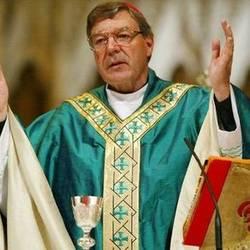Cardinal Pell Hopes for a Pope Who Knows How to Govern
By Gerard O'Connell
When Australia’s Cardinal George Pell goes into the conclave to elect the new Pope he will be looking for a candidate that is a strategist, a decision maker, has good and proven pastoral qualities, and the ability to govern Cardinal George Pell, 71, the Archbishop of Sydney, participated in the 2005 conclave which elected Benedict XVI and is now in Rome again to vote in the conclave to elect his successor. In this interview at Domus Australia he reflects on the resignation of Benedict XVI and speaks about the major challenges facing the Church today and tells me the qualities he is looking for in the candidate to be next pope. Were you surprised, shocked by the resignation of Benedict XVI? I was certainly surprised by the timing. I was aware that he was open to the possibility of retirement if he felt he wasn’t up to it. He had said as much in Seewald’s book. I was aware that he had visited the tomb of Celestine V, and I think he left his pallium there. So all those were signs that resignation was a live option for him, but I certainly didn’t expect it at that time. When he announced it what was your reaction? Mixed feelings I think like everybody else. There’s no doubt about it, the whole business is tinged with sadness. I understand that he has done it for the good of the Church. In some ways it’s a courageous decision, and I think he would be delighted that he would be able to announce it with almost nobody realizing that it was about to come. It was a genuine secret in the Vatican which is quite something. It does put a bit of question mark over the future, of course, but the Eastern Catholic Patriarchs are appointed for life and some of them stand down, as did the Superior General of the Jesuits, so it will depend a lot on the personality and health of the next popes. Do you think he has changed the papacy by his decision? To some extent, yes! Some people in Australia have said to me that he was bringing the Church into the 21st century. In the days when there was no intercontinental travel and no inter-continental media an incapacitated pope could limp along but the 24 hours news-cycle puts all these matters in a different perspective. And, of course, the Church is facing some very significant challenges and he might have felt that it needed a younger man to face up to these. How much do you think his decision to resign has been influenced by the Vatileaks scandal, the betrayal by the butler, and all the problems linked to governance that have arisen in these years? He said he has been grieved by those developments, but quite what impact they had on him in coming to this decision I really don’t know. Do you think the age factor will play a significant role in the conclave when it comes to choosing the next pope? Yes it’s always a significant factor. I think it’s unlikely that we will choose somebody who’s 77 or 78. I think it’s also unlikely that we will choose somebody who is too young, however you define that, because I think there’s virtue in the papacy changing every 10, 15 or 20 years. So you don’t anticipate a long papacy coming out of this conclave? Well they said that about Leo XIII and that papacy went on and on, so it’s foolish to anticipate anything. You have been through the conclave process in 2005 – the congregations of cardinals, the ‘murmurings’, the discussions about candidates, and you have a broad understanding of the Church, what qualities will you be looking for in a candidate to be the next pope? Let me start by telling you what I won’t be looking for. I won’t be looking for a candidate from a particular area. I think where the next pope comes from is quite secondary to his personal capacity to lead the Church. Some factors are rudimentary: a man of faith and prayer, a good track record, a man with languages. I don’t think we’re going to get a teacher of the caliber of Benedict or even of John Paul II. We might, but that would be a pleasant surprise. I think we need somebody who is a strategist, a decision-maker, a planner, somebody who has got strong pastoral capacities already demonstrated so that he can take a grip of the situation and take the Church forward. I mean when you compare the irreligion and the demographic decline in Europe, the violence against Christians in the Middle East, the need to try to open-up China, the problems of the (Roman) Curia are not in that league. But it would be very useful for the Church for the new Pope to be able to improve the morale of the Curia, to strengthen their sense of well-being. So the ability to govern is important The ability to govern is very important. It would appear that substantial problems have been identified through Vatileaks and such things, so I think these need to be addressed in a real way, and they need to be addressed in a way, you might even say symbolically, so that the world outside realizes that the new pope has grasped and is well aware of the opportunities that we have, but is also well aware of the particular challenges and is willing to try to do something about them.
|
.
Any original material on these pages is copyright © BishopAccountability.org 2004. Reproduce freely with attribution.
